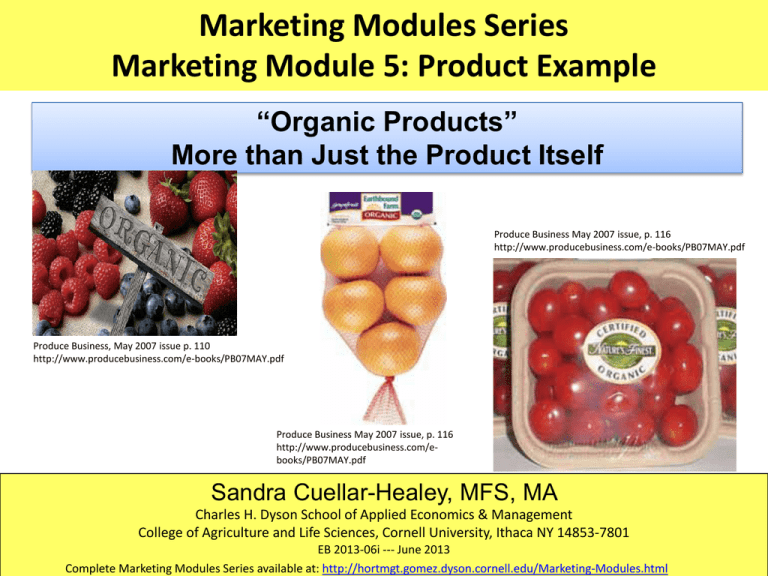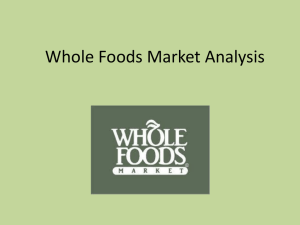Marketing Modules Series Marketing Module 5: Product Example “Organic Products”
advertisement

Marketing Modules Series Marketing Module 5: Product Example “Organic Products” More than Just the Product Itself Produce Business May 2007 issue, p. 116 http://www.producebusiness.com/e-books/PB07MAY.pdf Produce Business, May 2007 issue p. 110 http://www.producebusiness.com/e-books/PB07MAY.pdf Produce Business May 2007 issue, p. 116 http://www.producebusiness.com/ebooks/PB07MAY.pdf Sandra Cuellar-Healey, MFS, MA Charles H. Dyson School of Applied Economics & Management College of Agriculture and Life Sciences, Cornell University, Ithaca NY 14853-7801 EB 2013-06i --- June 2013 Complete Marketing Modules Series available at: http://hortmgt.gomez.dyson.cornell.edu/Marketing-Modules.html Organic Food Products are much more than the product itself. They encompass a range of real or perceived benefits for consumers, including: • Improving their Health • Consuming products that are perceived as more Nutritious and Flavorful • Eating Safely • Trusting the food source • Helping Protect the Produce Business May 2007 issue, p. 116 http://www.producebusiness.com/e-books/PB07MAY.pdf environment The information that follows was taken from the study ‘Organic Food and Drinks Retailing” – US – November 2009 , and illustrate consumers’ perceptions of organic products and their benefits Health “Good Health” was the leading reason for purchasing Organic Foods among 68% of participants in the 2009 Mintel Study* Photo from: Tap Five Minutes http://www.tapshli.org/tap24.html Other health-related reasons participants mentioned as reasons for purchasing organics, were: • For their children to eat well (59%) • Because of a personal health issue (37%) • Because of a family member’s health issue (13%) • To address a health issue (e.g. allergies) or treat a medical condition (27%) *Organic Food and Drink Retailing - US - November 2009 Nutrition Organic Foods are believed to have higher content of trace minerals, Vitamin C and other antioxidants as compared to conventional foods Additionally: Consumers of organic foods affirm they have better and richer flavor than their conventional counterparts Produce Business May 2007 issue, p. 116 http://www.producebusiness.com/e-books/PB07MAY.pdf Among participants in the 2009 Mintel study*: • 49% indicated they purchase organic foods because they are more nutritious than regular foods • 29% purchase them to lose or maintain weight *Organic Food and Drink Retailing - US - November 2009 Safety 45% of participants in the 2009 Mintel study* prefer foods without artificial additives Produce Business May 2007 issue, p. 116 http://www.producebusiness.com/ebooks/PB07MAY.pdf • Organic foods are considered “safer” than conventional products due to their lack of artificial flavors, colors, sweeteners, preservatives, residual antibiotics, growth hormones and pesticides Among the participants in the 2009 Mintel study: • 73% purchase organic foods because they don’t have artificial ingredients and •67% purchase them because they don’t have artificial preservatives *Organic Food and Drink Retailing - US - November 2009 Assurance 64% of participants in the 2009 Mintel study* look for a guarantee of “100% organic” when purchasing organic food and 60% look for the USDA organic seal on the products they buy Additionally: • 65% believe food and beverages can be labeled as “organic” as long as they meet government standards and • 45% indicated they can trust the term “organic” when they see it on a label As compared to the previous year (2008): • 27% of participants purchased more “certified organic produce” and • 39% of participants purchased about the same amount *Organic Food and Drink Retailing - US - November 2009 Protecting the Environment 82% of participants in the 2009 Mintel study* are more concerned about the environment than they were 5 years ago Photo: http://jonathanmpelleg.com/company/environment.jpg *Organic Food and Drink Retailing - US - November 2009 • 43% purchase organic products because they are concerned about sustainable farming, harmful pesticides, etc. • 75% purchased the same amount or more of “environmentally-friendly” household products (e.g. cleaners, recycled paper products, laundry soap, etc.) than the year before From the 2009 Mintel Study, Consumers’ Perceptions of Organic Products’ Benefits are evident in: • US Consumer Attitudes and Behavior Towards Organic Foods and • The Organic Foods US Market Trends and Forecasts U.S. Consumer Attitudes & Behavior Towards Organic Foods* • 59% of participants’ households purchase organic foods or beverages • 23 – 32% of participants are buying more organic food products than the year before • 43% - 47% of participants are buying organic products at the same rate as one year ago *Organic Food and Drink Retailing - US - November 2009 Sales of Organic Fruits & Vegetables in the U.S. Market Sales at Current Prices $ Million 2003 2004 2005 2006 2007 2008 2009 2010 2011 2012 2013 1800 1600 1400 1200 1000 800 600 400 200 0 According to the 2009 Mintel study*: • Packaged Organic Produce grew 24.2% between 2007-2008 • Sales of organic fruits and vegetables for 2013 are estimated to be over $1.6 Billion, with packaged organic salads accounting for a major portion of these sales • Standardized weight, size and price of packaged organic produce may be more appealing than ever, under the current economic conditions Source: *Organic Food and Drink Retailing – US – November 2009, Mintel/SPINScan Natural/SPINScan conventional ACNielsen Scantrack Organic Food & Beverages sold through Food, Drug and Mass Merchandising Stores in the US* • Increased 41% since 2006, with a particularly strong market during 2007-2008 • By the end of 2009 sales were estimated to be at $6.2 Billion • By 2012 sales were projected to be $8 Billion, with an increase of 28% between 2010-2012 * Not including Walmart, Trader Joe's or Private Label Products



